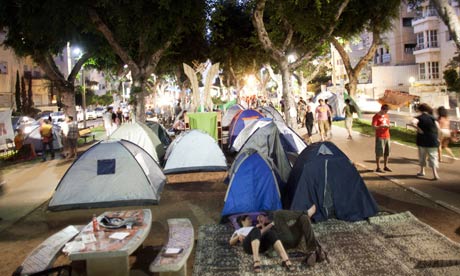Israelis Protest Against the Wrong Target

As French students and intellectuals were playing Robespierre and Mao on the streets of Paris in the Spring of 1968, Charles de Gaulle came out with a formula that was typical of his linguistic creativity: “La réforme oui, la chienlit non.” Journalists and commentators had to look up “chienlit” in the dictionary since nobody ever heard of that word. Chienlit was used in old French and it means “carnival mask.” What could the General possibly mean? A pun of course: divide-up the word with hyphens (“chie-en-lit”) and you get “shit-in-bed.” Ahem.
Israel was completely disconnected from “Mai 68.” France was at the height of its power and de Gaulle’s rule was unchallenged. Jean-Paul Sartre’s existentialist philosophy offered the perfect antidote to a bored youth. Israel’s young generation, by contrast, had just emerged victorious from the Six Day War. Fighting for their survival, and being involved in building a new country, young Israelis had no time for planning revolutions from the terrace of a café.
Aside from the “Black Panthers” in the 1970s, Israel never had a social revolt organized by the youth. Being raised in a conformist society with a uniform public discourse, and being taught to respect authority in the army, Israelis were never known for their revolutionary zeal. Add to this the challenge of making a living in a socialist economy and the stress of being in a permanent state of war, and you understand why Israel never had the equivalent of Mai 68.
So the fact that Israelis are finally taking to the streets is actually good news: It shows that Israel has become so wealthy and secure that people actually have the time and luxury to talk about changing the world with nargilas and guitars. Like the French who had never had it so good in the late 1960s, we too are having our “chienlit revolution” (“chiant,” by the way, means “boring” in French).
This is not to say, of course, that there is no economic hardship in Israel. There is poverty and there is hardship. But it is Israel’s pervasive oligopolies and unfair tax system that make it impossible for middle class families to make ends meet, let alone save money. Real estate is unaffordable because there is no offer; and there is no offer because Israel’s Land Administration abuses its monopoly. Nobody has done more than Benjamin Netanyahu break up monopolies and to lower taxes, so protesters are picking a fight with the wrong person.
Like the Mai 68 strikes, Israel’s current social protest is not led by the union movement. During Mai 68, France’s main workers’ union, CGT, tried to contain the spontaneous militancy by channeling it into a struggle for higher wages and other economic benefits. Even the Communist Party got cold feet, and Jean-Paul Sartre accused the Communists of “fearing revolution.” What rioters really wanted was the ousting of de Gaulle. Although the trade union leadership negotiated a 35% increase in the minimum wage, a 7% wage increase for other workers, and half normal pay for the time on strike, the workers occupying their factories refused to return to work. They demanded new elections.
Likewise, the main organizers of today’s protest in Israel are more interested in ousting Netanyahu than in improving the lot of struggling families. This is why the Im Tirtzu movement pulled out of the protest: it realized that protesters were looking for a fight, not for solutions.
At the end, Mai 68 was a flop. De Gaulle called for early elections and his party won the greatest victory in French parliamentary history. After the carnival, it was time to go to bed –in clean sheets.
Originally Posted at For the Sake of Zion.

